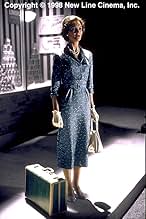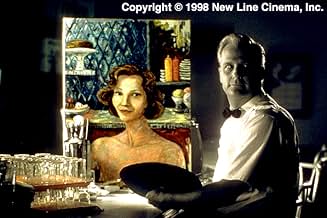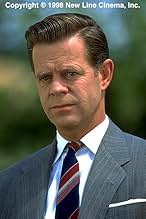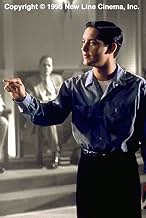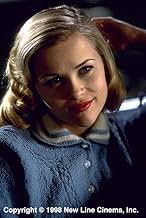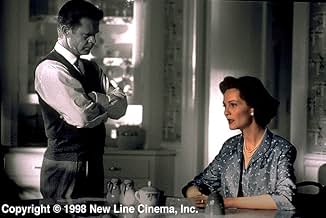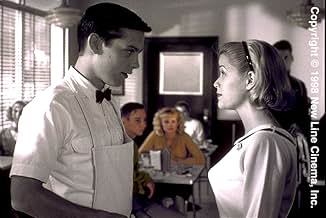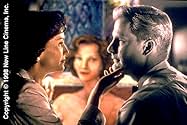Pleasantville
- 1998
- Tous publics
- 2h 4min
Deux frères et sœurs adolescents des années 1990 se retrouvent dans une sitcom des années 1950, où leur influence commence à changer profondément ce monde complaisant.Deux frères et sœurs adolescents des années 1990 se retrouvent dans une sitcom des années 1950, où leur influence commence à changer profondément ce monde complaisant.Deux frères et sœurs adolescents des années 1990 se retrouvent dans une sitcom des années 1950, où leur influence commence à changer profondément ce monde complaisant.
- Réalisation
- Scénario
- Casting principal
- Nommé pour 3 Oscars
- 18 victoires et 45 nominations au total
Avis à la une
Two 1990s teenagers find themselves in a 1950s sitcom where their influence begins to profoundly change that complacent world.
This is a surprisingly strong role for Reese Witherspoon, who tends to be an overrated actress. If anything, she is actually underrated here for how well she made Jenny her own character. The appearance of Don Knotts is a great touch, and William H. Macy is wonderful as always.
While a simple concept (kids getting sucked into the TV), the execution is a work of genius. Writer-director Gary Ross used this backdrop to explore race relations, the "good old days", changing cultures and mores... and exploring a range of "right and wrong". And underneath it all, it still remains a sense of humor and does not attempt to guilt trip the audience.
This is a surprisingly strong role for Reese Witherspoon, who tends to be an overrated actress. If anything, she is actually underrated here for how well she made Jenny her own character. The appearance of Don Knotts is a great touch, and William H. Macy is wonderful as always.
While a simple concept (kids getting sucked into the TV), the execution is a work of genius. Writer-director Gary Ross used this backdrop to explore race relations, the "good old days", changing cultures and mores... and exploring a range of "right and wrong". And underneath it all, it still remains a sense of humor and does not attempt to guilt trip the audience.
PLEASANTVILLE had to be one of the biggest surprises I've ever had at the movies. This superbly mounted and completely winning fantasy starred Toby Maguire and Reese Witherspoon as a contemporary teenage brother and sister who are magically transported into a black and white television show called "Pleasantville", a show similar to "Leave it to Beaver" or "I Love Lucy", where everyone in the town knows each other, where the fire department only saves cats from trees and never put out fires and where there are no pages in the books or toilets in the bathrooms. Maguire's character is a "Pleasantville" trivia expert so he knows everyone there and everything that's going to happen but sis Witherspoon is a stranger in a strange land whose introduction of 1990's sensibilities to the citizens of this town brings about extraordinary changes. The film is beautifully made with a very smart screenplay and superb performances, the best of which is by Joan Allen, who is luminous as Betty, the mother in the sitcom who is shocked at first but learns to accept the 1990's coming to Pleasantville. Yes, it may borrow from other movies, but there is a freshness and originality to this movie that is most engaging and anytime with Don Knotts is time well spent.
10Eddie C.
I knew what this film would be about before I rented it, but I'm stunned that it would be THIS good. Nothing against "Saving Private Ryan" or "Shakespeare in Love", but this film should have won Best Picture in 1998 and it was a shame that it wasn't nominated. It's an even bigger injustice that it did not get a nomination for best screenplay or cinematography.
In the hands of another writer, this movie could have been made as just a parody of 1950's sitcoms like "Leave It To Beaver" or "Ozzie and Harriet." But this film isn't about how clichéd those series look decades later. It's about the false nostalgia for a past that never existed. We survived the past and we know that everything turned out all right. Because of this, we selectively choose our memories and weed out the unpleasant ones. That's why the past is sometimes seen as "the good ol' days." Pleasantville does not represent how the 50's actually were but rather an idealization of what people THINK the 50's were---no one had sex, everyone got along swell, and life was fairly easy. Nothing could be further from the truth, and there are many film from that era which show how real people (even in suburbia) actually lived. This film argues that free will and choice is ESSENTIAL to life and that we should embrace freedom instead of fearing it. It isn't just about making out, but having the OPTION to make out.
Another reviewer claimed that this film was an attack on the 50's, but David and Jennifer could very easily have been dumped in the world of "The Brady Bunch", "Gilligan's Island" , or "Batman." But setting "Pleasantville" in a 1950's sitcom allows for the brilliant metaphor of black and white versus color. Black and white photography is a stylized depiction of the universe, but unless you're color blind it's not the way you actually see the universe. When we first see Pleasantville's citizens, all of them are cardboard cut-outs of stereotypes. As they begin to open up and become real people, color seeps into their world. The catalyst seems to be the willingness to experience new sensations and become vulnerable. Jennifer has slept with lot of guys when she was in the normal world, so sex does not change HER into a color character. On the other hand, when she actually finishes a book (without pictures) for the first time in her life, THEN she becomes colorized. Similarly, David does not bloom into color until he breaks out of his aloofness and defends his "mother." Compare the way he ignores his real mother at the beginning of the film to how he consoles and comforts her at the end to see how much David has changed.
I could go on and on, but I think you get the idea. There are a lot of films out there that are very entertaining and/or very moving--like "Raiders of the Lost Ark" or "Titanic." Movies like "Pleasantville" which challenge the audience and force them to think are very rare, and should be treasured by the discerning filmgoer.
In the hands of another writer, this movie could have been made as just a parody of 1950's sitcoms like "Leave It To Beaver" or "Ozzie and Harriet." But this film isn't about how clichéd those series look decades later. It's about the false nostalgia for a past that never existed. We survived the past and we know that everything turned out all right. Because of this, we selectively choose our memories and weed out the unpleasant ones. That's why the past is sometimes seen as "the good ol' days." Pleasantville does not represent how the 50's actually were but rather an idealization of what people THINK the 50's were---no one had sex, everyone got along swell, and life was fairly easy. Nothing could be further from the truth, and there are many film from that era which show how real people (even in suburbia) actually lived. This film argues that free will and choice is ESSENTIAL to life and that we should embrace freedom instead of fearing it. It isn't just about making out, but having the OPTION to make out.
Another reviewer claimed that this film was an attack on the 50's, but David and Jennifer could very easily have been dumped in the world of "The Brady Bunch", "Gilligan's Island" , or "Batman." But setting "Pleasantville" in a 1950's sitcom allows for the brilliant metaphor of black and white versus color. Black and white photography is a stylized depiction of the universe, but unless you're color blind it's not the way you actually see the universe. When we first see Pleasantville's citizens, all of them are cardboard cut-outs of stereotypes. As they begin to open up and become real people, color seeps into their world. The catalyst seems to be the willingness to experience new sensations and become vulnerable. Jennifer has slept with lot of guys when she was in the normal world, so sex does not change HER into a color character. On the other hand, when she actually finishes a book (without pictures) for the first time in her life, THEN she becomes colorized. Similarly, David does not bloom into color until he breaks out of his aloofness and defends his "mother." Compare the way he ignores his real mother at the beginning of the film to how he consoles and comforts her at the end to see how much David has changed.
I could go on and on, but I think you get the idea. There are a lot of films out there that are very entertaining and/or very moving--like "Raiders of the Lost Ark" or "Titanic." Movies like "Pleasantville" which challenge the audience and force them to think are very rare, and should be treasured by the discerning filmgoer.
First of all....I really liked it. Ignore any review (and reviewer) that says different. We live in a day and age that we seems like every movie has a touch of this old film and bit of that one...or is a remake or possibly a re-release. But Pleasantville is none of that...it is unique, fresh, reflective, pleasant (you knew I was going to use that word someplace), sad, but yet still had a touch of fun. The film begins by looking at the interaction between and the lives of a brother (Tobey Maguire) and sister (Reese Witherspoon). The brother is very content with his life and enjoys watching television, in particular, the show, Pleasantville. His sister, a bit more outgoing, enjoys meeting new people and seeing where this interaction will lead. A fight over which show to watch results in the intervention by Don Knotts (of Andy Griffith and Three's Company fame). Maguire and Witherspoon are wisked into the television set and take center stage as two of the Pleasantville cast. The only difference is while the world may be watching a tv show, to them, this is their reality. The film appears to be in black and white, but as each character opens their mind or changes from the perception of the Pleasantville tv show, then they begin to gain color. As those in color become more prevalent, the old black & whites become resistant to change. To ebb the flow of change, the black and whites react violently against the "new colors" and begin placing restrictions on them. Yes the similarities of the 60s civil rights movement are here as are the violent acts of the Nazis in pre-World War II. But while you see these, you are also brought to the realization that there still exists a great deal of prejudice, discrimination, and close-mindedness in this world. One of the most pleasing aspects of this film is the cinematography, the mixing of the colors with the black & white shots were great. The story keeps your interest and the characters impact upon each member of the audience in their own special way. This is one film to see for I think you will hear more about it around Oscar time. Bottom line...if we open our minds more towards others, letting them be who they are, rather than who we want them to be, then not only will we be richer in color, but also richer in character.
Pleasantville should be nominated for Best Director and Best Cinematography, and perhaps Best Supporting Actor for William H. Macy. Joan Allen, Jeff Daniels and Tobey Maguire are also excellent, and the idea is brilliant. In other words, this film is one of the best of the year. It is fun for the eyes and filled with wonderful allusions to great books and other films, not to mention some similar events in our country's past. If you will let yourself go from reality and put a little thought into it, you will realize the sheer genius behind this film. The messages were plenty and appropriate, and while it is extremely fun to watch, it still is able to evoke deeper emotions. Fantastic, and my vote for second best film of the year behind Saving Private Ryan.
Le saviez-vous
- AnecdotesAt one point, when Jennifer tries to use a bathroom there aren't any toilets. This is a clever reference to an FCC ruling during the 1950's, which stated that toilets (or any reference to their use, such as the sound of flushing) could not be presented on television. While this continued on broadcast television well in to the late seventies, the barrier in movies fell in 1960 (two years after the Pleasantville scenario) when Alfred Hitchcock persuaded the film censors to allow the flushing of a toilet in Psychose (1960) because it was integral to the iconic shower scene.
- GaffesVarious inconsistencies and plot holes (stopped clocks, phantom opposing basketball teams) with the real world are consistent with Pleasantville being a TV world, and hence consistent with the movie.
- Crédits fousThe New Line logo plays in complete silence.
- ConnexionsFeatured in Fiona Apple: Across the Universe (1998)
- Bandes originalesAcross the Universe
Written by John Lennon and Paul McCartney
Performed by Fiona Apple
Produced by Jon Brion
Courtesy of Clean Slate/The WORK Group
Meilleurs choix
Connectez-vous pour évaluer et suivre la liste de favoris afin de recevoir des recommandations personnalisées
Détails
- Date de sortie
- Pays d’origine
- Langue
- Aussi connu sous le nom de
- Amor a colores
- Lieux de tournage
- Petaluma, Californie, États-Unis(Scenes filmed at Petaluma Blvd and Western Ave.)
- Sociétés de production
- Voir plus de crédits d'entreprise sur IMDbPro
Box-office
- Budget
- 60 000 000 $US (estimé)
- Montant brut aux États-Unis et au Canada
- 40 584 421 $US
- Week-end de sortie aux États-Unis et au Canada
- 8 855 063 $US
- 25 oct. 1998
- Montant brut mondial
- 49 805 462 $US
- Durée
- 2h 4min(124 min)
- Couleur
- Mixage
- Rapport de forme
- 1.85 : 1
Contribuer à cette page
Suggérer une modification ou ajouter du contenu manquant



